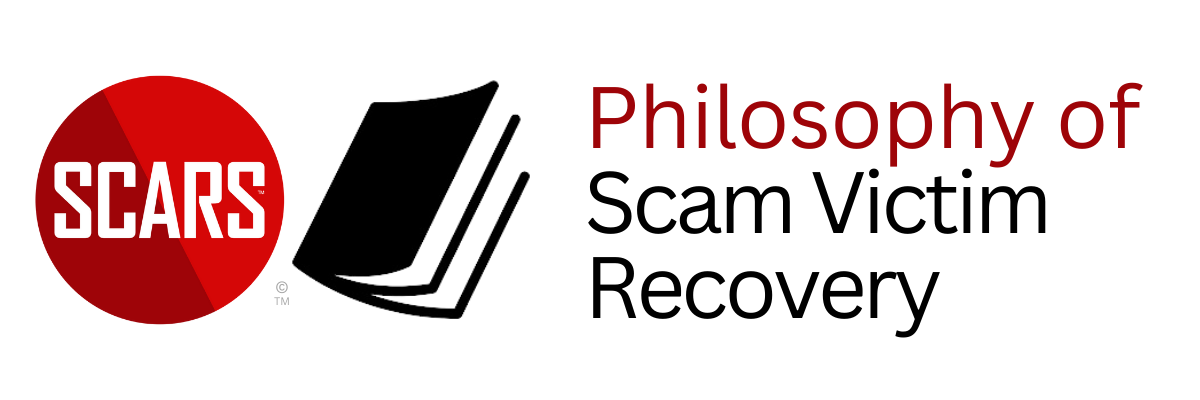The Prodigal Son or Daughter – Returning ‘Home’ After the Scam
The Long Road Home: Scam Victim Recovery and the Parable of the Prodigal Son or Lost Daughter
Primary Category: Scam Victim Recovery Philosophy
Intended Audience: Scam Victims-Survivors / Family & Friends
Author:
• Tim McGuinness, Ph.D., DFin, MCPO, MAnth – Anthropologist, Scientist, Polymath, Director of the Society of Citizens Against Relationship Scams Inc.
About This Article
The Parable of the Lost Son (Luke 15:11–32, NIV) offers a powerful metaphor for scam victims on the path to emotional and psychological recovery. It tells the story of someone who leaves in pursuit of more, suffers collapse and shame, then returns with humility and courage, only to be met with compassion, not condemnation. As a scam victim, you may recognize yourself in this narrative. You may have reached for connection, purpose, or security, only to be deceived and left emotionally stranded.
Recovery often begins when you “come to your senses,” admitting the truth of what happened and choosing to walk back toward yourself. That return is not always met with understanding by others, but it does not need their approval. It requires your honesty, your courage, and your willingness to rebuild. Like the lost son or daughter, you are not beyond restoration. You are in the process of returning—not to who you were, but to who you are becoming.

The Long Road Home: Scam Victim Recovery and the Parable of the Prodigal Son or Lost Daughter
A Story of Collapse, Awakening, and Return
The Parable of the Lost Son, also known as the Prodigal Son, found in Luke 15:11–32 (NIV), is a story about separation, suffering, and redemption.
It is not only a religious teaching, but a deeply psychological and emotional account of what it means to fall, to lose yourself, and then to return—not only to others, but to yourself. If you are a scam victim in recovery, this parable speaks directly to your journey. It mirrors the path you have walked, from the moment of departure to the day you begin to come home.
Jesus tells the story of a younger son who demands his inheritance early, leaves home, and wastes everything in reckless living. After his money runs out, a famine hits. The son ends up starving, alone, and reduced to feeding pigs—so degraded that he envies their food. Only then, at the lowest point of his life, does he realize he must return to his father and ask for mercy. What happens next is unexpected: the father runs to him, embraces him, restores him, and celebrates his return.
For scam victims, this story is not about sin or forgiveness. It is about psychological breakdown, disorientation, shame, grief, awakening, and healing. It is about what it means to lose your way and then find the courage to come back—not only to safety, but to dignity.
We present this, not for religious purposes, but to allow those who practice their faith to find stories that they can relate to.
The Meaning of Prodigal
Prodigal is an adjective (prod·i·gal)
A prodigal is characterized by profuse or wasteful expenditure. Though it can be used to blame, we simply mean that the scam was a wasteful expenditure of time and money.
It also means one who has returned after an absence, such as having been locked in the scam for a period of time,
Leaving Home: The Desire for More
In the parable, the son asks for his inheritance while his father is still alive. This act reflects not just entitlement, but a restless desire to leave behind the constraints of his current life. He wants more. He wants freedom, status, and experience. He believes that life is waiting for him elsewhere. He is that Prodigal Son!
This is where many scam victims begin. You may not have left home literally, but you may have reached for something more—love, companionship, financial security, purpose, or a fresh start. You may have responded to a message, accepted a friend request, or started a conversation because something inside you longed for connection or change. There is no shame in wanting more. The problem begins when that desire is exploited.
Just like the son in the parable, you may have walked away from your previous life without knowing what was ahead. You may have invested not only money, but emotion, time, and trust in someone who seemed to offer what you were looking for. And like the son, you may not have realized how vulnerable you had become until everything began to unravel.
Collapse in the Far Country
The prodigal son travels to a “distant country” and wastes everything. When the famine comes, he is unprepared. He becomes destitute and desperate. Emotionally, this moment reflects the collapse many scam victims experience when the truth is revealed. The fantasy is gone. The person you loved, admired, or trusted disappears. The money is gone. The promises were lies. The future you were building disintegrates.
You may feel like you are stranded in a foreign land. Not physically, but psychologically. You may feel you no longer recognize yourself. You may be overwhelmed by shame, guilt, or confusion. Like the son, you may see yourself as unworthy—not just of help, but of respect. You may feel like you have forfeited your right to be seen or heard. That inner collapse is often the hardest part of scam trauma.
You are not alone in that feeling. It is part of the human condition to lose the path. In the parable, the turning point does not come when the son is rescued. It comes when he comes to his senses, much like how scam victims become survivors by accepting that they are the victim of a crime and that it was not their fault.
The Awakening: Coming to Yourself
Luke 15:17 says, “When he came to his senses, he said, ‘How many of my father’s hired servants have food to spare, and here I am starving to death!’” This moment marks the beginning of recovery. The prodigal son remembers who he was. He does not deny what has happened. He faces it. He does not rationalize it or minimize it. He sees it clearly. He does not imagine instant restoration. He simply decides to return.
This moment is familiar to many scam victims. It is the first time you stop pretending. You admit the truth—not just that you were scammed, but that you were hurt, disoriented, and emotionally exposed. You stop replaying fantasies. You stop bargaining with reality. You start to see your situation with clear eyes.
This is a moment of metanoia—of turning. It does not fix everything, but it changes your direction. It is the beginning of your way back.
The Return Journey: Shame and Courage
The prodigal son prepares his speech: “I am no longer worthy to be called your son; make me like one of your hired servants.” He expects rejection. He expects to earn his way back, if he is allowed back at all. This mindset reflects how many scam victims feel after discovery. You may believe you must punish yourself to deserve recovery. You may assume others will judge you. You may carry a burden of shame so heavy it silences you.
But recovery does not require self-condemnation. It requires courage. The courage to face the truth. The courage to grieve. The courage to ask for help. The courage to walk toward healing even when you are still in pain. Like the son in the parable, you may feel unworthy. But your worth is not based on how you fell. It is based on your willingness to stand again. Axios – you are worthy!
The Father’s Response: Restoration Over Judgment
While the son is still far off, the father sees him, runs to him, embraces him, and restores him completely. He does not ask for explanations. He does not demand proof of remorse. He rejoices. “This son of mine was dead and is alive again; he was lost and is found.” (Applies to Daughters too.)
This part of the story speaks to what many scam victims fear they will not receive—compassion, understanding, and restoration. You may believe you have to justify your pain or prove your worth. But true recovery begins when you stop trying to earn the right to heal. You do not have to be perfect. You do not have to have all the answers. You do not have to undo the past.
You only have to come home—to yourself, to the truth, and to those who care enough to walk with you. The father’s response is not fantasy. It is a reflection of what every person deserves when they have been broken: not judgment, but restoration.
The Older Brother: Navigating Judgment and Resentment
The parable ends with the older brother refusing to join the celebration. He resents the restoration of his younger sibling. He focuses on fairness, performance, and control. This part of the story reminds you that not everyone will understand your pain. Some people may blame you. Some may question why you trusted so easily. Some may stay stuck in resentment while you are trying to heal.
Their judgment does not define your path. You are not here to meet someone else’s expectations. You are here to recover your identity, dignity, and peace. If others cannot see your transformation, that is their limitation, not yours. You do not need their toxicity in your life.
The father tells the older brother, “We had to celebrate and be glad, because this brother of yours was dead and is alive again.” In your recovery, you may have to advocate for your own celebration, your own healing, your own worth—even when others cannot see what you’ve survived. This is what boundaries are for.
Coming Home: What It Means for Scam Victims
Coming home, in this context, means returning to your integrity. It means reclaiming your voice. It means being honest about what happened without being defined by it. You were lost for a time—not because you were weak, but because someone took advantage of your hope, trust, or need. But that is not the end of your story.
The parable of the lost son is not a story of disgrace. It is a story of awakening. It is a story of how clarity and humility can lead to healing. It is about the courage to return, the power of compassion, and the truth that even after betrayal and collapse, restoration is possible.
You are not beyond redemption. You are not disqualified from peace. You are someone who fell, who learned, and who now walks a path of return. And as you walk, you will begin to recognize yourself again—not as broken, but as alive.
Conclusion
The Parable of the Lost Son or Daughter is more than an ancient teaching. It is a mirror for the emotional and psychological experience of scam victims in recovery. When you have been deceived and left in ruin—emotionally, financially, or spiritually—it can feel as if you have lost your way entirely. This story helps you see that the journey back is not only possible, it is already underway the moment you begin to see clearly. Your departure, your fall, your collapse in a far-off emotional country does not disqualify you from healing. You are allowed to return. And what you return to is not judgment or humiliation, but the chance to rebuild a life grounded in truth.
Coming home is not about undoing the past. It is about claiming who you are now. Like the prodigal son, or the lost daughter, your worth has not expired. Your story is not over. You may feel shame or fear or regret. But your decision to stand, to turn, and to walk toward your recovery is the beginning of a new identity. Not a perfect one. A true one. You are not the crime that happened to you. You are the person coming home from it. And you are worthy of compassion, understanding, and peace—no matter how far you wandered.
Everyone can return home!
-/ 30 /-
What do you think about this?
Please share your thoughts in a comment below!
One Comment
Leave A Comment
Important Information for New Scam Victims
- Please visit www.ScamVictimsSupport.org – a SCARS Website for New Scam Victims & Sextortion Victims.
- SCARS Institute now offers its free, safe, and private Scam Survivor’s Support Community at www.SCARScommunity.org – this is not on a social media platform, it is our own safe & secure platform created by the SCARS Institute especially for scam victims & survivors.
- SCARS Institute now offers a free recovery learning program at www.SCARSeducation.org.
- Please visit www.ScamPsychology.org – to more fully understand the psychological concepts involved in scams and scam victim recovery.
If you are looking for local trauma counselors, please visit counseling.AgainstScams.org
If you need to speak with someone now, you can dial 988 or find phone numbers for crisis hotlines all around the world here: www.opencounseling.com/suicide-hotlines
Statement About Victim Blaming
Some of our articles discuss various aspects of victims. This is both about better understanding victims (the science of victimology) and their behaviors and psychology. This helps us to educate victims/survivors about why these crimes happened and not to blame themselves, better develop recovery programs, and help victims avoid scams in the future. At times, this may sound like blaming the victim, but it does not blame scam victims; we are simply explaining the hows and whys of the experience victims have.
These articles, about the Psychology of Scams or Victim Psychology – meaning that all humans have psychological or cognitive characteristics in common that can either be exploited or work against us – help us all to understand the unique challenges victims face before, during, and after scams, fraud, or cybercrimes. These sometimes talk about some of the vulnerabilities the scammers exploit. Victims rarely have control of them or are even aware of them, until something like a scam happens, and then they can learn how their mind works and how to overcome these mechanisms.
Articles like these help victims and others understand these processes and how to help prevent them from being exploited again or to help them recover more easily by understanding their post-scam behaviors. Learn more about the Psychology of Scams at www.ScamPsychology.org
SCARS INSTITUTE RESOURCES:
If You Have Been Victimized By A Scam Or Cybercrime
♦ If you are a victim of scams, go to www.ScamVictimsSupport.org for real knowledge and help
♦ SCARS Institute now offers its free, safe, and private Scam Survivor’s Support Community at www.SCARScommunity.org/register – this is not on a social media platform, it is our own safe & secure platform created by the SCARS Institute especially for scam victims & survivors.
♦ Enroll in SCARS Scam Survivor’s School now at www.SCARSeducation.org
♦ To report criminals, visit https://reporting.AgainstScams.org – we will NEVER give your data to money recovery companies like some do!
♦ Follow us and find our podcasts, webinars, and helpful videos on YouTube: https://www.youtube.com/@RomancescamsNowcom
♦ Learn about the Psychology of Scams at www.ScamPsychology.org
♦ Dig deeper into the reality of scams, fraud, and cybercrime at www.ScamsNOW.com and www.RomanceScamsNOW.com
♦ Scam Survivor’s Stories: www.ScamSurvivorStories.org
♦ For Scam Victim Advocates visit www.ScamVictimsAdvocates.org
♦ See more scammer photos on www.ScammerPhotos.com
You can also find the SCARS Institute’s knowledge and information on Facebook, Instagram, X, LinkedIn, and TruthSocial
Psychology Disclaimer:
All articles about psychology and the human brain on this website are for information & education only
The information provided in this and other SCARS articles are intended for educational and self-help purposes only and should not be construed as a substitute for professional therapy or counseling.
Note about Mindfulness: Mindfulness practices have the potential to create psychological distress for some individuals. Please consult a mental health professional or experienced meditation instructor for guidance should you encounter difficulties.
While any self-help techniques outlined herein may be beneficial for scam victims seeking to recover from their experience and move towards recovery, it is important to consult with a qualified mental health professional before initiating any course of action. Each individual’s experience and needs are unique, and what works for one person may not be suitable for another.
Additionally, any approach may not be appropriate for individuals with certain pre-existing mental health conditions or trauma histories. It is advisable to seek guidance from a licensed therapist or counselor who can provide personalized support, guidance, and treatment tailored to your specific needs.
If you are experiencing significant distress or emotional difficulties related to a scam or other traumatic event, please consult your doctor or mental health provider for appropriate care and support.
Also read our SCARS Institute Statement about Professional Care for Scam Victims – click here
If you are in crisis, feeling desperate, or in despair, please call 988 or your local crisis hotline – international numbers here.
More ScamsNOW.com Articles
A Question of Trust
At the SCARS Institute, we invite you to do your own research on the topics we speak about and publish. Our team investigates the subject being discussed, especially when it comes to understanding the scam victims-survivors’ experience. You can do Google searches, but in many cases, you will have to wade through scientific papers and studies. However, remember that biases and perspectives matter and influence the outcome. Regardless, we encourage you to explore these topics as thoroughly as you can for your own awareness.















![NavyLogo@4x-81[1] The Prodigal Son or Daughter - Returning 'Home' After the Scam - 2025](https://scamsnow.com/wp-content/uploads/2025/04/NavyLogo@4x-811.png)










![scars-institute[1] The Prodigal Son or Daughter - Returning 'Home' After the Scam - 2025](https://scamsnow.com/wp-content/uploads/2025/04/scars-institute1.png)

![niprc1.png1_-150×1501-1[1] The Prodigal Son or Daughter - Returning 'Home' After the Scam - 2025](https://scamsnow.com/wp-content/uploads/2025/04/niprc1.png1_-150x1501-11.webp)
It’s true that the judgment of others does not define my path but if after “coming home”
those closest to you, on whose help and support you count, judge, blame,
it hurts tremendously
and …it takes so little then to give up or worse, to leave that home once again.
How important it is then to find a professional support group!